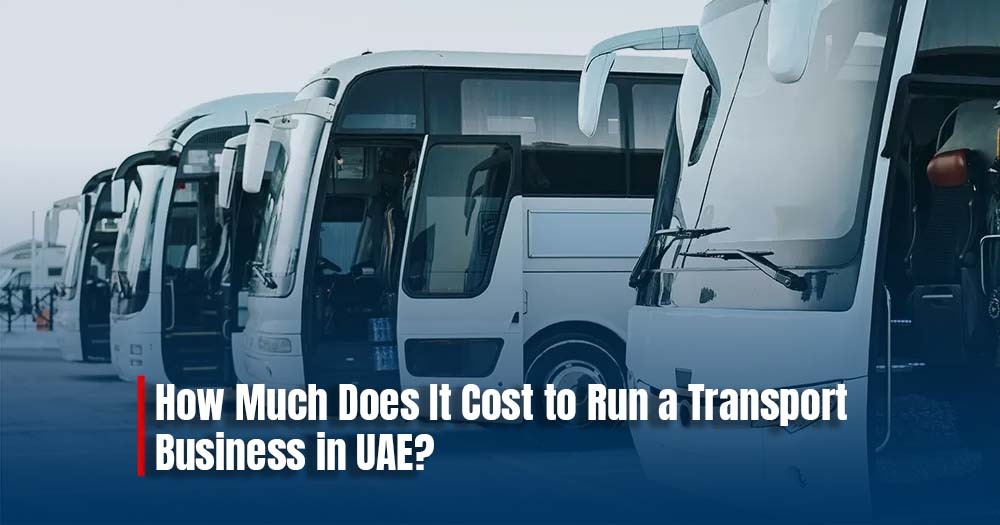Transport business in UAE is booming, driving over 9% of the national GDP according to the UAE Ministry of Economy (moec.gov.ae). With continuous investments in roads, ports, and logistics hubs, demand for transport services keeps rising. But how much does it really cost to run one? Whether you plan to start with light vehicles or trucks, knowing the real expenses helps you plan smarter and stay competitive in this growing market.
Table of Contents
Toggle- 10 Reasons to Start a Transportation Business in Dubai 2025
- Dubai Transport Business 2025: Essential Rules and Licensing Guide
- Activities Under a Transport License in Dubai (2025 Updated Guide)
- Documents Required to Start a Transport Business in Dubai
- Transport Company License in Dubai 2025: Step-by-Step Registration Guide
- How Much Does It Cost to Start a Light-Vehicle Transport Business in the UAE? (2025 Guide)
- Summary
- FAQ’s
10 Reasons to Start a Transportation Business in Dubai 2025
- Strategic Global Location
Dubai lies between Asia, Africa, and Europe. Therefore, it provides quick access to three major markets. This position gives transport companies constant demand and global connections. - World-Class Infrastructure
The city has one of the best logistics networks in the world. Roads, ports, and airports are modern, safe, and built for speed. As a result, goods and people move faster and at lower cost. - Stable and Open Economy
Dubai’s economy is diverse and reliable. Trade, tourism, and logistics keep it strong. Hence, business owners enjoy steady growth and lower risk. - Tax Benefits
Businesses enjoy zero personal income tax and low corporate tax in free zones. This makes operations more profitable and reduces expenses. - Business-Friendly Government
The licensing process is smooth. Authorities such as RTA and DED allow quick company registration and renewals. That makes starting a business simple and legal. - Free Zones for Investors
Investors can set up in free zones like JAFZA, Dubai South, or DAFZA. These areas offer full ownership, customs benefits, and simple visa procedures. - High Demand Across Sectors
Growing e-commerce, tourism, and industrial expansion increase the need for freight, cargo, and passenger transport services every year. - Smart Digital Transport System
Dubai supports technology-driven logistics. GPS tracking, online permits, and fleet monitoring are standard. Therefore, operations stay efficient and transparent. - Skilled and Reliable Workforce
Dubai attracts trained drivers, fleet managers, and logistics specialists. This ensures quality service and smooth operations. - Expansion and Networking Opportunities
Dubai hosts trade shows and logistics events that connect local companies with global partners. Consequently, business owners gain visibility and growth potential.
Free Zone vs Mainland Setup
|
Aspect |
Free Zone |
Mainland |
|
Ownership |
100% foreign ownership |
UAE national partner required |
|
Tax Benefits |
Full exemption in most zones |
Subject to standard rates |
|
Market Access |
International focus |
UAE domestic and government contracts |
|
Setup Speed |
Faster registration |
Moderate, requires local approvals |
|
Ideal For |
Import/export, logistics |
Passenger, delivery, local operations |
Why Start Now
Starting a transport business in UAE today gives you access to one of the fastest-growing logistics markets in the world. The city’s infrastructure, location, and trade ecosystem create unmatched potential for long-term success.
For expert help with setup, licensing, and visa processing, Business LinkUAE provides professional support to make your launch smooth and compliant. With clear guidance and reliable service, you can establish your transport company in Dubai and grow it confidently.
Dubai Transport Business 2025: Essential Rules and Licensing Guide
Running a transport business in Dubai means following clear government rules. These rules protect safety, ensure fair operations, and help you stay fully licensed. Each step below outlines what you must follow to operate legally and grow with confidence.
Main Regulations for Transport Companies in Dubai
- You must get a commercial license from the Department of Economy and Tourism (DET) or your chosen free zone.
- The Roads and Transport Authority (RTA) issues your main operation card, which allows your business to function legally.
- You must also obtain a No Objection Certificate (NOC) from the RTA to start or renew a transport license.
- The RTA records show over 12,000 active transport and rental companies with more than 255,000 registered vehicles in Dubai.
- All vehicles must be registered under your company name and meet RTA inspection standards before they operate.
- You must have valid insurance that covers passengers, goods, and third-party damage.
- All drivers need UAE driving licenses for the exact category of vehicles they operate.
- Every heavy or commercial vehicle must include a speed limiter to follow road safety laws.
- You must also follow Salik toll rules and maintain enough balance to prevent fines.
- The Federal Land Transport Law requires all transport businesses to have a valid federal license for commercial activity.
- If your company operates autonomous or smart vehicles, you must obtain additional RTA approval.
- Companies with revenue above the legal limit must register for 5% VAT and corporate tax under UAE law.
- Businesses in free zones enjoy 100% ownership and tax advantages but must still comply with RTA and DET transport rules.
- The RTA may require a minimum fleet size before granting full approval, depending on your service category.
- Sectors such as refrigerated or fuel transport must secure extra permits from Dubai Municipality before operating.
Following these regulations keeps your company legal, trustworthy, and ready for growth in Dubai’s competitive market. Staying compliant not only protects your license but also builds long-term client confidence.

Activities Under a Transport License in Dubai (2025 Updated Guide)
- Passenger Transport by Light Vehicles: Used for carrying passengers in commercial cars or vans. Ideal for staff shuttle, school pickup, or private group trips. Companies must follow RTA passenger safety standards.
- Goods Transport by Light Trucks: Covers delivery and cargo services within Dubai or across the UAE. Includes movement of equipment, furniture, or small goods. Light truck operators must meet roadworthiness and load capacity rules.
- Heavy Vehicle Freight Transport: Designed for companies handling bulk goods or industrial supplies. Businesses must obtain special RTA approval for heavy vehicle operation and driver certification.
- Refrigerated Transport Services: Required for firms moving perishable goods like food, beverages, or pharmaceuticals. Vehicles must include cooling systems and meet Dubai Municipality hygiene regulations.
- Vehicle Rental Without Driver: Allows rental of cars, vans, or trucks for short or long terms. Each vehicle must be registered, insured, and listed under the company’s commercial license.
- Luxury and Limousine Transport: Enables companies to operate high-end vehicles for VIP clients, hotels, or corporate events. RTA imposes specific conditions on model type, interior standards, and chauffeur uniforms.
- Courier and Parcel Delivery Services: For businesses offering same-day or scheduled parcel delivery. The service includes local e-commerce logistics, express delivery, and document handling.
- Bus Passenger Transport: Covers group transport services for employees, schools, and tour operators. Companies must obtain prior approval for routes and bus types.
- Specialized and Hazardous Goods Transport: Includes the movement of medical waste, chemicals, or heavy machinery. Requires safety permits and trained staff certified for hazardous material handling.
Additional Permitted Support Activities
|
Category |
Activity |
Purpose |
|
Fleet Support |
Vehicle Maintenance & Repair |
Maintain fleet efficiency and safety compliance |
|
Admin Support |
Transport Consultancy |
Offer consultancy or coordination services for logistics planning |
|
Storage |
Warehousing & Logistics |
Store goods before or after transport operations |
|
Equipment |
GPS and Fleet Management |
Monitor driver performance, safety, and route planning |
Key Insights Before Applying
- Always select the correct activity code under DET when applying.
- Apply for RTA permits linked to each vehicle type.
- Choose between mainland and free zone setup depending on your contracts.
- Check that insurance coverage matches your vehicle category and driver profile.
- Keep updated with RTA fee revisions to avoid compliance issues.
Choosing the right licensed activity ensures your transport business in UAE stays compliant, reduces legal risk, and builds credibility with clients. Companies that match their activity with their actual service type gain faster approval and smoother renewals.
Documents Required to Start a Transport Business in Dubai
Starting a transport business in Dubai demands accurate documentation and compliance with local laws. Each document serves as proof of eligibility, Here is a list of the documents needed:
- Trade Name Reservation Certificate: Confirms your business name is approved.
- Initial Approval Certificate: Issued by the DET or free zone to allow further processing.
- Memorandum of Association (MOA): A notarized document showing company structure, ownership percentage, and capital share.
- Commercial License: The final license permitting commercial operations in Dubai.
Each of these must match your intended activity to ensure quick approval.
2. Industry-Specific Licenses and Vehicle Permits
These papers authorize you to operate within the UAE transport sector.
- RTA Operation Card (Transport License): Grants permission to run vehicles for commercial use.
- Vehicle Registration Cards: Every vehicle must be registered under your company’s name.
- Vehicle Roadworthiness Certificates: Proof that your fleet meets safety standards.
- Insurance Policies: Must include vehicle, cargo, and third-party coverage to meet RTA rules.
These ensure your business meets UAE transport safety and compliance laws.
3. Identification and Ownership Documents
Required for all shareholders, partners, and drivers.
- Passport Copies and Emirates IDs for each shareholder.
- Residence Visa Copies (if resident in the UAE).
- Passport-Size Photos with a white background.
- Driving Licenses for drivers with correct vehicle category approval.
4. Operational and Support Documents
These confirm your operational capacity and financial readiness.
- Proof of Business Address: Valid tenancy contract or title deed.
- Business Plan: Includes fleet details, routes, revenue forecast, and management plan.
- Bank Reference or Financial Statement: Demonstrates financial stability.
- RTA or Authority NOC: Required for specific transport activities.
When all documents are complete, the DET and RTA process your application quickly. By maintaining accuracy and timely renewals, your transport business in UAE will operate legally, efficiently, and ready for growth in one of the region’s strongest logistics markets.
Transport Company License in Dubai 2025: Step-by-Step Registration Guide
Starting a transport business in the UAE requires more than permits. It takes the right approvals, compliance, and planning. Dubai’s logistics market reached USD 169.7 billion in 2024 and is projected to grow to USD 241.6 billion by 2030 with a 6.1 % CAGR. That growth makes it the ideal time to enter the sector.
1. Choose the Business Type and Zone
Select your niche first. It could be cargo, passenger, rental, or cold-chain transport.
Then decide where to register:
- Mainland: Allows nationwide operations.
- Free Zone: Offers full ownership and easier imports.
This choice affects licensing, tax, and ownership rules.
2. Reserve Your Trade Name
- Check the Dubai DED or relevant free zone rules.
- Your name must match your transport activity.
- Once approved, get your Trade Name Reservation Certificate, the first step before licensing.
3. Obtain Initial Approval
- Apply to the Dubai Department of Economy and Tourism (DET) for initial clearance.
- Certain transport categories also need a No Objection Certificate (NOC) from the Roads and Transport Authority (RTA).
4. Draft and Notarize Your Memorandum of Association (MOA)
- This document defines ownership shares, capital, and management rights.
- All partners must sign it before it is notarized by an authorized notary.
5. Apply for the Commercial License
- Submit your MOA, trade-name certificate, and approvals to the DET or free zone authority.
- Once verified, you receive your Commercial License, required before RTA registration.
6. Register with the Roads and Transport Authority (RTA)
- All transport companies must register with the RTA to create a company account.
- This registration links your business to the RTA system and enables transport activity permits.
7. Obtain the Transport License (Operation Card)
The RTA Operation Card authorizes you to operate commercial vehicles legally.
Each vehicle must be registered under your company name.
8. Prepare Fleet and Compliance Documents
Submit:
- Vehicle registration cards and chassis numbers
- Inspection certificates confirming roadworthiness
- Valid insurance covering vehicles, goods, and third-party liability
Each step ensures compliance with UAE safety standards.
9. Provide Identification and Business Address
- Attach passport copies, residence visas, and Emirates IDs for shareholders and drivers.
- Include a tenancy contract or title deed for your registered business address.
10. Add Business Plan and Financial Proof
- Create a short business plan showing routes, fleet size, and expected income.
- Include bank references or statements as proof of capital and sustainability.
11. Register for Taxes and Extra Permits
- If your income crosses thresholds, register for 5 % VAT and corporate tax.
- For hazardous or cold-chain transport, obtain additional permits from Dubai Municipality.
12. Pay Fees and Activate Your License
- After document review, pay DET and RTA fees.
- Once complete, collect your final Transport Company License and start operations.

13. Key Documents and Issuing Authorities
|
Document |
Authority |
Purpose |
|
Trade Name Certificate |
DET / DED |
Approves business name |
|
Initial Approval / NOC |
DET / RTA |
Authorizes setup step |
|
MOA / AOA |
Notary Public |
Defines structure & ownership |
|
Commercial License |
DET |
Permits operations |
|
RTA Operation Card |
RTA |
Legal vehicle use |
|
Vehicle Permit |
RTA |
Ensures fleet compliance |
|
Insurance |
Licensed Insurer |
Covers risk and liability |
A well-prepared file cuts approval time and avoids rejections. Once your license is active, you can operate legally and expand within Dubai’s fast-growing logistics sector.
Following these steps keeps your transport business in UAE compliant, scalable, and future-ready.
How Much Does It Cost to Start a Light-Vehicle Transport Business in the UAE? (2025 Guide)
Starting a light-vehicle transport business in the UAE in 2025 means budgeting smart from day one. The average setup cost ranges from AED 180,000 to AED 260,000, depending on your fleet, location, and license type.
Below is a breakdown of the typical costs you should prepare for.
Startup Cost Breakdown
|
Item |
Estimated Range (AED) |
Notes |
|
Trade License & Approvals |
12,000 – 25,000 |
DET, activity permits, RTA approvals |
|
RTA Transport License |
3,500 – 15,000 |
To operate commercial vehicles |
|
Office / Yard Lease (Yearly) |
15,000 – 40,000 |
Varies by emirate and size |
|
Fleet (2–3 Light Vehicles) |
100,000 – 150,000 |
New vans cost more but break less |
|
Vehicle Registration & Testing |
2,000 – 5,000 per vehicle |
RTA roadworthiness inspections |
|
Insurance (per vehicle) |
3,000 – 7,000 |
Covers third party, cargo, damage |
|
Driver & Admin Salaries |
5,000 – 10,000 / month |
Depending on staff experience |
|
Bank & Admin Fees |
2,000 – 5,000 |
Account setup, compliance, banking |
|
Branding & Website |
5,000 – 10,000 |
Logo, site, vehicle graphics |
|
Equipment (GPS, Cameras) |
1,000 – 1,500 / vehicle |
Optional but useful for safety |
Setup Scenarios
|
Type |
Fleet |
Location |
Total Cost (AED) |
|
Lean Start |
2 vans |
Free zone |
~180,000 |
|
Balanced |
3 vans |
Mainland |
~230,000 – 250,000 |
|
Premium |
3 new vans |
Prime area |
~260,000+ |
Factors That Affect Total Cost
- Vehicle Type: New vans cost more but reduce early repair bills
- Location: Mainland setups offer wider reach; free zones may lower admin fees
- Permits: Transporting cold chain or hazardous goods adds cost and steps
- Insurance Terms: Higher vehicle specs and driver history can raise premiums
- VAT & Tax: Once you cross AED 375,000 in turnover, VAT applies
Smart Tips to Keep Costs Under Control
- Start with 2 vans and grow based on confirmed demand
- Book vehicle tests online to skip queue fees
- Sign short leases first; upgrade when contracts increase
- Track monthly expenses and adjust routes or fuel plans if needed
Expect a starting budget of AED 180,000 to AED 260,000 depending on how lean or full-scale you go. Always confirm fees with RTA and DET before committing. Clear documents, early planning, and accurate budgeting will help you get licensed faster and stay compliant.
Summary
Starting a transport business in UAE can open real income opportunities if you plan with clear costs and legal setup. The UAE market keeps growing fast, and success depends on proper registration, the right license, and smart budgeting. Business Link helps you handle every step, from company setup to visas and approvals, so you can start quickly and safely. Call Business Link today to begin your transport business in UAE with confidence.
Call our team today via phone at +97143215227, WhatsApp at +971502052735, or email at connect@businesslinkuae.com and get clear answers, expert advice, and hands-on help so you can attend your appointment fully prepared and confident.
FAQ’s
How much does it cost to start a transport business in UAE?
Costs range between AED 180,000 and AED 260,000 depending on fleet size, license type, and location.
What license is required for a transport business in UAE?
You need an RTA transport license and a commercial license from the Dubai Department of Economy and Tourism (DET).
How can I register a transport company in Dubai?
Register your company through DET or a free zone, then apply for RTA approval and an operation card.
What documents are needed to start a transport business in UAE?
Key documents include trade name approval, MOA, commercial license, RTA NOC, vehicle permits, and insurance papers.
Is a local sponsor required to open a transport business in UAE?
Yes, a UAE national partner is required for mainland setups. Free zones allow 100% foreign ownership.
What are the main types of transport activities in Dubai?
They include passenger transport, goods delivery, heavy vehicle freight, refrigerated transport, and limousine services.
What are the benefits of starting a transport business in UAE?
You gain access to tax benefits, strong infrastructure, global connections, and a fast-growing logistics market.
Can foreigners own a transport company in UAE?
Yes. In free zones like JAFZA or Dubai South, foreign investors can own 100% of their business.
How long does it take to get a transport license in Dubai?
Usually between 10 to 15 working days once all documents and approvals are submitted.
Who can help me set up a transport business in UAE?
Business LinkUAE provides complete assistance with licensing, registration, visas, and RTA approvals to start your transport business easily.




